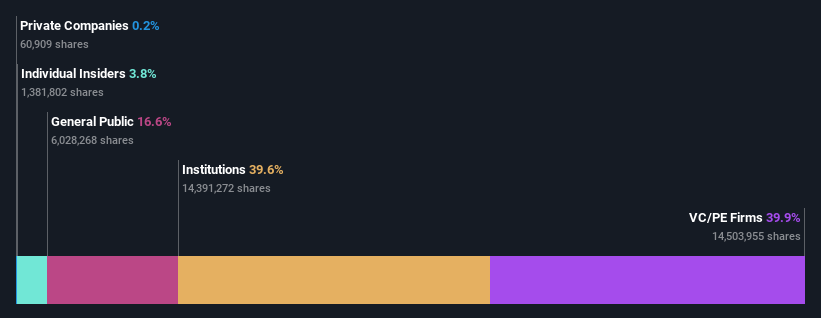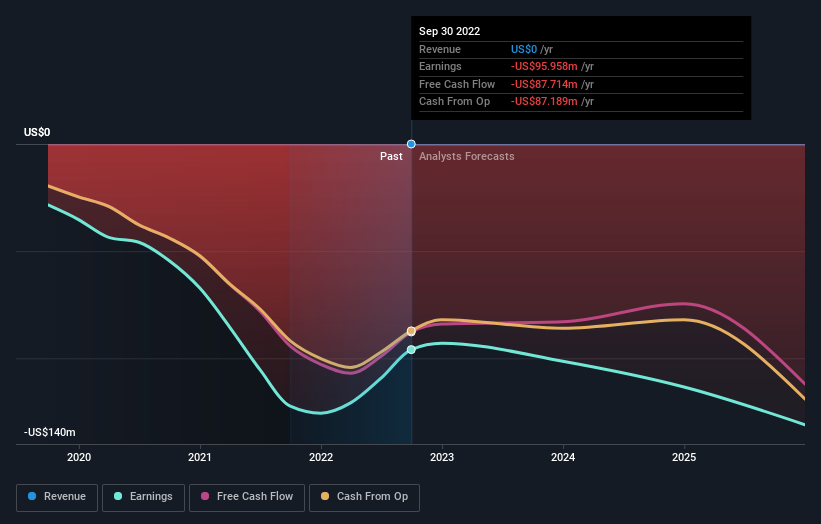private equity firms who own 40% along with institutions invested in Black Diamond Therapeutics, Inc. (NASDAQ:BDTX) saw increase in their holdings value last week
A look at the shareholders of Black Diamond Therapeutics, Inc. (NASDAQ:BDTX) can tell us which group is most powerful. We can see that private equity firms own the lion's share in the company with 40% ownership. In other words, the group stands to gain the most (or lose the most) from their investment into the company.
Following a 33% increase in the stock price last week, private equity firms profited the most, but institutions who own 40% stock also stood to gain from the increase.
Let's take a closer look to see what the different types of shareholders can tell us about Black Diamond Therapeutics.
See our latest analysis for Black Diamond Therapeutics
What Does The Institutional Ownership Tell Us About Black Diamond Therapeutics?
Institutional investors commonly compare their own returns to the returns of a commonly followed index. So they generally do consider buying larger companies that are included in the relevant benchmark index.
Black Diamond Therapeutics already has institutions on the share registry. Indeed, they own a respectable stake in the company. This can indicate that the company has a certain degree of credibility in the investment community. However, it is best to be wary of relying on the supposed validation that comes with institutional investors. They too, get it wrong sometimes. It is not uncommon to see a big share price drop if two large institutional investors try to sell out of a stock at the same time. So it is worth checking the past earnings trajectory of Black Diamond Therapeutics, (below). Of course, keep in mind that there are other factors to consider, too.
We note that hedge funds don't have a meaningful investment in Black Diamond Therapeutics. Versant Venture Management, LLC is currently the largest shareholder, with 18% of shares outstanding. For context, the second largest shareholder holds about 15% of the shares outstanding, followed by an ownership of 9.5% by the third-largest shareholder. Furthermore, CEO David M. Epstein is the owner of 2.6% of the company's shares.
On looking further, we found that 55% of the shares are owned by the top 5 shareholders. In other words, these shareholders have a meaningful say in the decisions of the company.
While it makes sense to study institutional ownership data for a company, it also makes sense to study analyst sentiments to know which way the wind is blowing. There are plenty of analysts covering the stock, so it might be worth seeing what they are forecasting, too.
Insider Ownership Of Black Diamond Therapeutics
The definition of company insiders can be subjective and does vary between jurisdictions. Our data reflects individual insiders, capturing board members at the very least. Company management run the business, but the CEO will answer to the board, even if he or she is a member of it.
Most consider insider ownership a positive because it can indicate the board is well aligned with other shareholders. However, on some occasions too much power is concentrated within this group.
We can report that insiders do own shares in Black Diamond Therapeutics, Inc.. In their own names, insiders own US$4.3m worth of stock in the US$114m company. It is good to see some investment by insiders, but we usually like to see higher insider holdings. It might be worth checking if those insiders have been buying.
General Public Ownership
With a 17% ownership, the general public, mostly comprising of individual investors, have some degree of sway over Black Diamond Therapeutics. This size of ownership, while considerable, may not be enough to change company policy if the decision is not in sync with other large shareholders.
Private Equity Ownership
With a stake of 40%, private equity firms could influence the Black Diamond Therapeutics board. Sometimes we see private equity stick around for the long term, but generally speaking they have a shorter investment horizon and -- as the name suggests -- don't invest in public companies much. After some time they may look to sell and redeploy capital elsewhere.
Next Steps:
It's always worth thinking about the different groups who own shares in a company. But to understand Black Diamond Therapeutics better, we need to consider many other factors. To that end, you should learn about the 4 warning signs we've spotted with Black Diamond Therapeutics (including 2 which can't be ignored) .
But ultimately it is the future, not the past, that will determine how well the owners of this business will do. Therefore we think it advisable to take a look at this free report showing whether analysts are predicting a brighter future.
NB: Figures in this article are calculated using data from the last twelve months, which refer to the 12-month period ending on the last date of the month the financial statement is dated. This may not be consistent with full year annual report figures.
Have feedback on this article? Concerned about the content? Get in touch with us directly. Alternatively, email editorial-team (at) simplywallst.com.
This article by Simply Wall St is general in nature. We provide commentary based on historical data and analyst forecasts only using an unbiased methodology and our articles are not intended to be financial advice. It does not constitute a recommendation to buy or sell any stock, and does not take account of your objectives, or your financial situation. We aim to bring you long-term focused analysis driven by fundamental data. Note that our analysis may not factor in the latest price-sensitive company announcements or qualitative material. Simply Wall St has no position in any stocks mentioned.
Join A Paid User Research Session
You’ll receive a US$30 Amazon Gift card for 1 hour of your time while helping us build better investing tools for the individual investors like yourself. Sign up here

 Yahoo Finance
Yahoo Finance 

